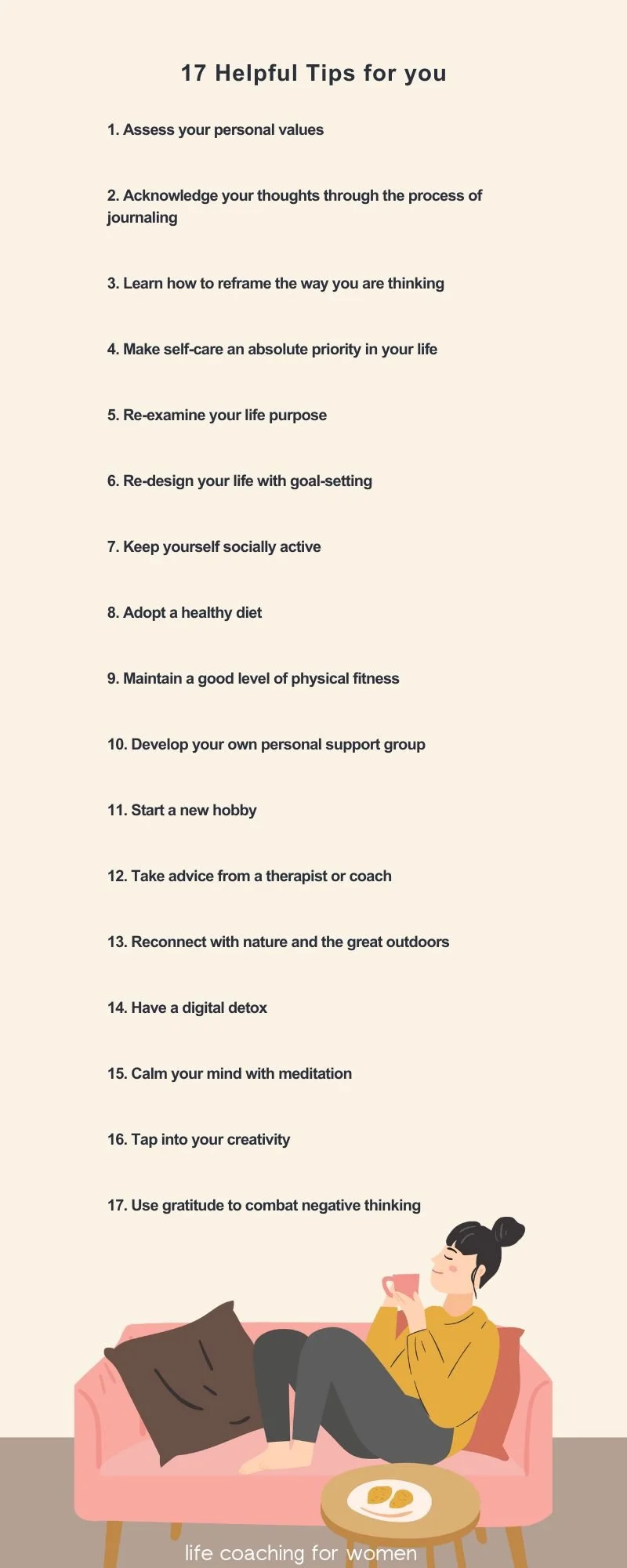Midlife Crisis in Women: 17 Helpful Tips for You
What are the symptoms of a midlife crisis in a woman?
By the time you get to your mid-life years, you will have already been through so much. You will have experienced many changes up to this point, good and bad - career changes, marriage, divorce, children leaving home, deaths and house moves.
All of the situations that you experience in your life will have an impact physically and mentally. In fact, by the time you get into your late forties and fifties, you will have experienced so much you may no longer recognise the person you once were.
The lessons of life can change you in many ways and this can lead to feeling lost, lacking direction and unsure of who you are any more.
It can be at this point a crisis of self can develop or a “mid-life crisis.”
A midlife crisis in women can manifest through a variety of symptoms that often reflect a mental struggle with ageing and life fulfilment.
Common signs include dissatisfaction or restlessness, re-evaluating life choices, and a desire for change in personal or professional areas.
Emotional symptoms such as anxiety and depression may arise, accompanied by a sense of urgency to pursue dreams or goals left unaddressed. Additionally, changes in relationships, including conflicts with partners or friends, can occur as women seek deeper connections or reconsider their roles.
Physical changes, such as shifts in energy levels or appearance, may also prompt reflections on self-worth and identity, fueling the crisis further.
What are the three stages of a midlife crisis?
A midlife crisis typically unfolds in three stages. The first stage is often characterized by confusion and self-reflection, where you may question your life choices, accomplishments, and purpose in life.
During this phase, feelings of dissatisfaction can emerge, prompting a deep evaluation of personal values and priorities.
This is the stage where many women can feel more depressed and dissatisfied with their lives and can feel stuck
The second stage involves exploration and experimentation, where you may seek new experiences or opportunities to recapture vitality and excitement, often leading to significant life changes or shifts in relationships.
The final stage is acceptance, where you finally come to terms with your life trajectory, embracing who you truly are and integrating what you have learned throughout this point in your life so you move forward with more direction and purpose.
How to treat a midlife crisis
A midlife crisis in women can be addressed through self-reflection and proactive change. Start by acknowledging your feelings and fears, allowing yourself to understand the underlying emotions driving this crisis.
Seeking support through life coaching or counselling can provide valuable guidance and tools to navigate this transition.
Setting new personal goals, exploring hobbies, or even pursuing education can reignite passion and purpose.
It’s also a good idea to cultivate a strong support network of friends and family, people you love and trust, as sharing experiences can provide comfort and insight.
Prioritizing self-care and focusing on physical and mental well-being will help build resilience and clarity during this phase of your life.
17 Helpful Tips for You
1. Assess your personal values
A good area to start if you are feeling stressed in midlife is to assess your core values. This can be a transformative step towards finding clarity and purpose. It's important to take the time to reflect on what truly matters to you — whether that is family, career, health, or personal development.
By identifying and prioritizing these values, you can create a roadmap that guides your decisions and actions. This process not only helps in reassessing your goals but also aligns your life with what genuinely fulfils you.
With a clearer understanding of your values, you can navigate this period with confidence, making choices that resonate deeply with who you are.
2. Acknowledge your thoughts through the process of journaling
Acknowledge your thoughts through the process of journaling as a powerful tool to navigate a midlife crisis.
When you put pen to paper, you clarify your feelings and explore the underlying reasons for why you feel as you do.
Journaling helps to reveal patterns in your thinking, allowing you to identify fears, desires, and unfulfilled goals that may be contributing to your sense of discontent.
Journaling encourages self-reflection, building a deeper understanding of your experiences enabling you to take actionable steps toward change.
3. Learn how to reframe the way you are thinking
Reframing your thinking during a midlife crisis involves shifting your perspective on your age, achievements, and what the future holds. Instead of viewing this phase as a time of loss or stagnation, consider it an opportunity for growth and reinvention.
Acknowledge your feelings, but challenge any negatives that come with them. Focus on what you can control, embracing new experiences and setting fresh goals. By redefining your understanding of midlife as a chance to evolve—rather than a decline— you can cultivate a mindset that builds resilience and empowers you to chart a meaningful path forward.
4. Make self-care an absolute priority in your life
Taking time for activities that feed your body, mind, and spirit can enhance your resilience and clarity, leading to better decision-making.
This dedicated focus on self-care can involve simple practices like daily meditation, regular exercise, or pursuing hobbies that bring you joy.
By investing in yourself, you establish a refreshed perspective and the confidence needed to navigate life's transitions, ultimately creating a greater sense of fulfilment and balance.
5. Re-examine your life purpose
Re-examining your life purpose can be a transformative step for those working through a midlife crisis.
This period often brings a sense of unrest or questioning about the path you have travelled so far. Taking the time to reflect on your values, passions, and what truly brings you fulfilment can provide clarity and direction.
Consider what you want to achieve moving forward and how your experiences can inform those goals. Shifting your mindset and embracing this opportunity for growth can help you realign with your true self, paving the way for a more meaningful and intentional life.
6. Re-design your life with goal-setting
Redesigning your life during a midlife crisis can be a powerful journey that leads to renewed purpose and growth.
This period often catalyzes self-reflection, prompting you to reassess your goals, desires, and the path you are on.
By taking the time to evaluate what truly matters to you—whether it’s pursuing a new career, rekindling passions, or forging deeper relationships—you can create a clear vision of the life you want to live.
Embracing change, setting achievable goals, and seeking support through life coaching can empower you to navigate this transition with confidence, ultimately allowing you to build a life that feels true to you.
7. Keep yourself socially active
Staying socially active is important during a midlife crisis, as it helps establish connections and combats feelings of isolation.
Engaging with friends, family, and community groups can provide a sense of belonging and support, offering opportunities to share experiences and insights. Participating in social activities—whether through clubs, volunteering, or classes—encourages personal growth and challenges negative thought patterns.
Surrounding yourself with positive influences and engaging in meaningful conversations can reignite passions, boost self-esteem, and ultimately lead to a more fulfilling life experience during this transitional phase.
8. Adopt a healthy diet
What you eat plays an important role in how you feel mentally and physically. As you reach mid-life you may experience shifts in energy levels, mood, and overall well-being.
Eating a balanced diet rich in whole foods, such as fruits, vegetables, lean proteins, and whole grains, can provide essential nutrients that support both physical and mental health.
This nutritional base not only boosts energy but also enhances mood stability, which can help alleviate feelings of anxiety or depression often associated with mid-life struggles.
By prioritizing healthy eating habits, you can regain a sense of control in your life and prepare for the years ahead.
9. Maintain a good level of physical fitness
Maintaining a good level of fitness plays an important role in navigating a midlife crisis. Regular physical activity not only improves physical health but also boosts mental well-being, providing a sense of stability and control during this transitional phase.
Engaging in exercise releases endorphins, which can improve mood and alleviate feelings of anxiety or depression often associated with midlife challenges. Additionally, fitness routines create structure and purpose, helping you to reconnect with your body and goals, strengthening resilience and the ability to embrace change more positively.
10. Develop your own personal support group
Developing your own personal support group can be an invaluable step in navigating a midlife crisis.
Surround yourself with people who resonate with your experiences, such as friends, family members, or colleagues who are also undergoing similar life transitions.
Create a safe space where everyone can openly share their feelings, challenges, and triumphs without judgment.
Regular gatherings, whether in-person or virtual, allow for mutual encouragement and the exchange of strategies for coping and growth.
Consider inviting a professional, like a life coach or therapist, to facilitate discussions and provide tools to manage changes effectively.
Together, this group can create a sense of community, understanding, and accountability that enables you to embrace this pivotal stage of life with confidence.
11. Start a new hobby
Starting a new hobby can be a transformative way to navigate a midlife crisis, as it encourages personal growth and exploration. Engaging in activities like painting, gardening, or learning a musical instrument can reignite passion and creativity, creating a sense of accomplishment and joy.
These pursuits provide an opportunity to break away from routine, meet new people, and discover hidden talents, all of which boost your self-esteem and reignite a love for life. Embracing a new hobby not only helps to fill your time but also creates a positive outlet for emotions and a gives you renewed sense of purpose.
12. Take advice from a therapist or coach
Navigating a midlife crisis can be challenging, and seeking advice from a therapist or coach can provide valuable insights and support.
By engaging in open conversation, you can clarify your goals, identify any limiting beliefs, and develop practical strategies to create a more fulfilling life.
Additionally, they can guide you in redefining your identity and purpose during this transformative period, encouraging you to embrace new opportunities and make meaningful changes.
13. Reconnect with nature and the great outdoors
Reconnecting with nature can be a wonderful antidote to the feelings of uncertainty and restlessness that often accompany a midlife crisis.
Immersing yourself in the great outdoors allows for a shift in perspective, offering a break from daily stresses and routines.
Whether it’s taking a leisurely walk in a nearby park, hiking through a serene forest, or simply sitting by a tranquil lake, the sights and sounds of nature can stimulate a sense of peace and clarity.
Engaging with the environment also encourages mindfulness, enabling you to focus on the present moment and reflect on your values and goals.
14. Have a digital detox
Put down the technology and step back from the stress it creates. A digital detox can be a powerful tool for navigating a midlife crisis, offering the opportunity to step back from the constant noise of social media and digital distractions.
By disconnecting from online platforms, you will gain clarity and reflect on your desires, values, and goals.
This break allows you to explore yourself more fully and it will give you the chance to engage in offline activities that build personal growth, creativity, and connection with others.
By prioritizing time away from screens, you can reassess your future path, cultivate mindfulness, and discover renewed purpose and direction.
15. Calm your mind with meditation
Meditation can be a powerful tool for calming the mind during a midlife crisis, providing a much-needed sanctuary from the chaos of daily life.
By dedicating just a few minutes each day to this practice, you will build a sense of inner peace and clarity. Focusing on the breath and letting go of intrusive thoughts allows for deeper self-reflection, helping to identify underlying fears and aspirations.
As the mind becomes quieter, it opens up space for new perspectives and solutions to emerge, allowing you to navigate challenges with confidence and grace. Embracing meditation not only relieves stress but also enhances emotional resilience, paving the way for a renewed sense of purpose to move through your life.
16. Tap into your creativity
During a midlife crisis, tapping into your creativity can serve as a powerful catalyst for self-discovery and personal growth. Engaging in creative activities—whether it's painting, writing, or exploring new hobbies—allows you to express your emotions and thoughts in a constructive manner.
This exploration can uncover hidden passions and interests that may have been sidelined, fostering a renewed sense of purpose. By embracing creativity, you can shift your focus from anxiety and uncertainty to inspiration and possibility, helping you navigate this transformative period with confidence and clarity.
17. Use gratitude to combat negative thinking
Practising gratitude can be a powerful tool for combating negative thinking, especially during a midlife crisis.
By consciously acknowledging and appreciating the positives in your life, you will shift your focus away from feelings of loss or discontent.
Mindfulness encourages a mindset of abundance rather than scarcity, helping to build resilience and optimism.
Keeping a gratitude journal, where you jot down all you are grateful for daily, can serve as a constant reminder of what is valued, creating a sense of purpose and joy amid uncertainties.
By integrating gratitude into daily routines, you will be able to cultivate a more balanced perspective and embrace change with confidence.
Giving thanks with gratitude will enhance every area of your life and can deepen the relationship you have with yourself and those around you.
Final Thoughts
Navigating a midlife crisis can be challenging, but a few helpful tips can make a significant difference.
First, take time for self-reflection to understand your feelings and desires; journaling can be particularly useful for clarifying your thoughts.
Establishing new goals, both personal and professional, can help create a sense of purpose and direction.
Connecting with supportive friends and family provides a necessary emotional outlet while seeking professional guidance through coaching can offer tailored strategies for change.
Lastly, prioritizing self-care, whether through exercise, hobbies, or mindfulness practices, can improve your overall well-being, allowing you to embrace this transitional phase with a positive mindset.
If you would like to listen to the audio version of this blog post click below;
If you have enjoyed this blog post please comment and share below














